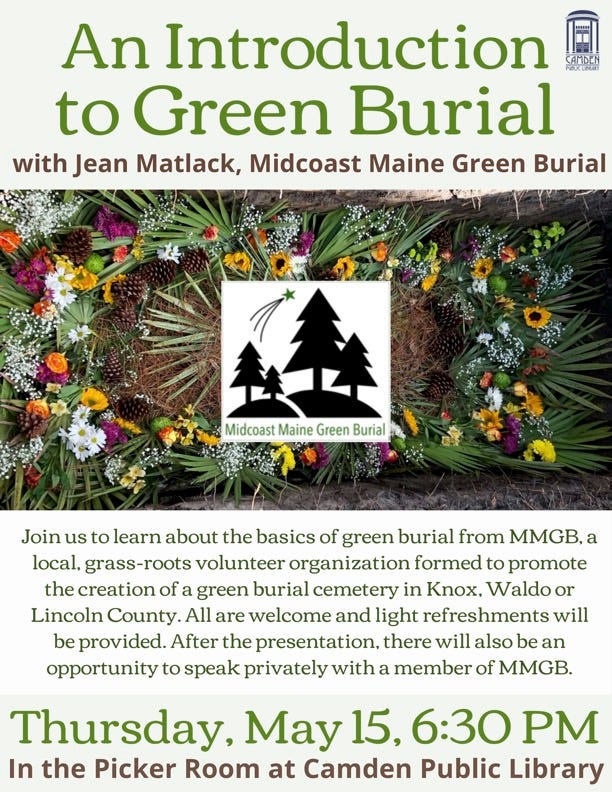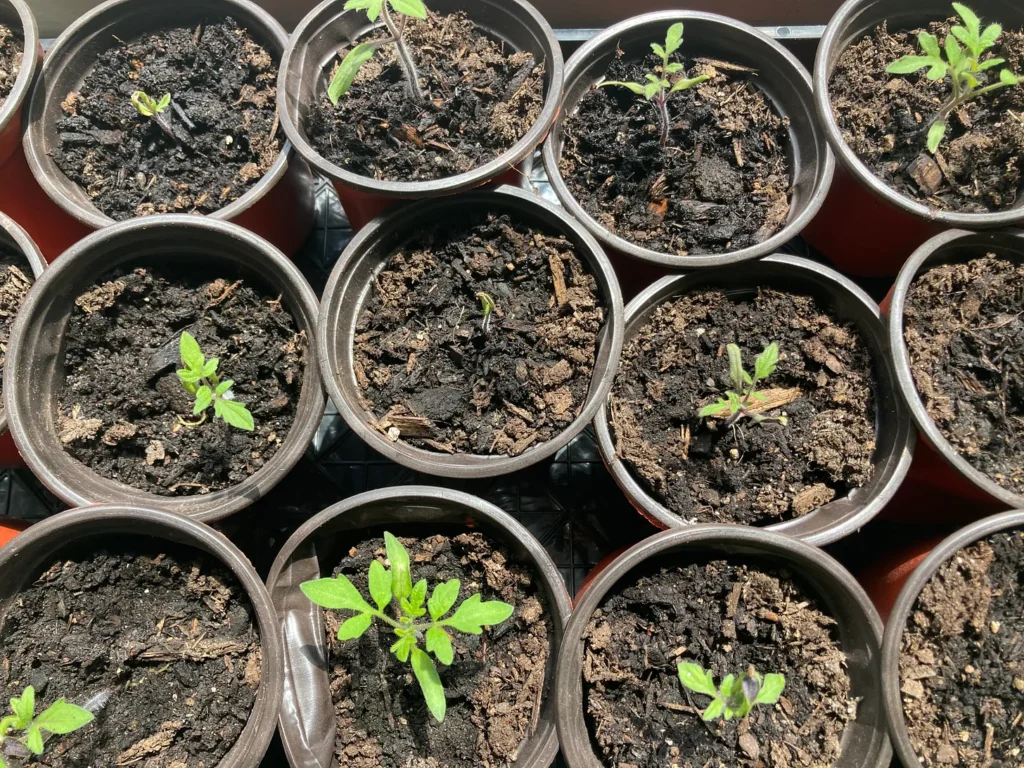Fostering a World Where Each of Us Plays a Role in Emissions Reductions
and Other Solutions for Life on a Warming Planet
Last week we had the chance to listen as local 7th graders asked how they could tackle issues of climate change, part of an annual solutionaries program where youth and community members grapple together with real-world problems.
We were struck by the earnestness and the care the students expressed—and their recognition that, while it’s hard to cope with the prospect of a warming world, it’s important to do the work that coping requires. In the next weeks, they’ll be sketching out possibilities for solving complex problems, from the proliferation of plastics in our homes/bodies/oceans, to the seas rising at the doorstep of one student’s family restaurant on the harbor.
It’s heartening. We hope these issues are discussed in classrooms, boardrooms, town offices, and living rooms on a daily basis.
Last week also offered a chance to attend a gathering of climate workers and organizers in Freeport—where the idea of a state-wide climate corps blossomed—a force of individuals like you and me, openly and willingly putting wide-ranging climate action front and center in our lives, even as many across the country are retreating from these issues.
What would it mean to live in a state where in every community folks knew one another by the work they were doing to tackle the multiple crises created by our warming world?
Some folks would be making their communities more accessible for climate refugees. Some neighbors would be helping one another rewild formerly barren lawns. Other folks would be bolstering local emergency planning and communications so citizens are prepared for the anticipated flooding and storms (the just-passed LD1 provides help to communities for this task). Others would be hosting repair cafes and teaching workshops on permaculture and home food gardening.
Businesses would be embracing zero-waste packaging. Homes and businesses and municipal buildings would be moving toward 100% weatherization, aided by local incentives. Villages would be emphasizing walkability and ride sharing, and sponsoring art walks when only non-motorized traffic is allowed on certain streets.
Some would be urging a reconsideration of the economic imperative for constant growth, instead considering an ecologically-based economy (May 16-17, Friday-Saturday, in South Paris, Maine, the Center for an Ecology-Based Economy’s [CEBE] 2030 Vision Climate Convergence. See more here.)
Many of our Camden/Rockport neighbors are already taking on the initiatives listed above.
We are building our climate corps, too! All this is heartening.
We’ve listed many local climate-change-related events below, and look forward to fostering continued community endeavors that prioritize our Earth’s planetary needs.
Let’s build a climate-resilient Midcoast those 7th graders can be proud of.
Food for Thought
Maine’s Solar Future—Despite the federal noise, solar is alive and well in Maine. Tax credits still exist, the sun still shines. This podcast, from Let’s Connect Greater Portland, is with Phil Coupe, co-founder of ReVision Energy, who remains bullish about the future of renewable energy despite the lack of support from the Trump administration. Listen here.
Your Destiny is My Destiny—There are many terrific Maine writers focusing on the impacts of living in a climate-changed world. Jason Anthony is one. His latest essay, entitled “Each Other’s Destiny: The Fate of All Life is Our Fate, Too,” struck an important chord, providing insights into finding balance—and light—in our times:
The predators and parasites of the political/corporate world fall into the meaningless chasm that spawned them when we pay attention to the real world. Everything is community, all life is beautiful and strange and largely unknown, and the deeper we look the more connections we find. More and more, in fact, I envision life as connections and flows rather than species and habitats. Individuals do not exist. We turtles, humans, marsh wrens, and cattails are perhaps better described as astonishing microbial assemblages, and better understood as communal nodes in a sea of interdependence, nutrients, and light.
After a meander through multiple topics, including some sage ideas about technology, Anthony comes back to our need to care for and reattach to the real world, ending with this Mary Oliver quote:
I would say that there exist a thousand unbreakable links between each of us and everything else, and that our dignity and our chances are one. The farthest star and the mud at our feet are a family; and there is no decency or sense in honoring one thing, or a few things, and then closing the list. The pine tree, the leopard, the Platte River, and ourselves—we are at risk together, or we are on our way to a sustainable world together. We are each other’s destiny.
May 13, Tuesday, 4:00 – 5:00 pm, Camden Public Library, CamdenCAN’s Climate Conversation Circles. Restarting this second and fourth Tuesday circle, open-ended facilitated conversation about climate, ecological overshoot, local climate policy—anything folks bring up related to our climate-changed reality. See more here.
May 15, Thursday, 6:30 pm, Camden Public Library. “An Introduction to Green Burial” with Jean Matlack, a member of the nonprofit Midcoast Maine Green Burial (MMGB). MMGB is a local, grassroots volunteer organization formed to promote the creation of a green burial cemetery in Knox, Waldo, or Lincoln County, Maine. Jean will present about the basics of green burial, “a way of caring for the dead with minimal environmental impact that aids in the conservation of natural resources, the reduction of carbon emissions, the protection of worker health, and the restoration and protection of habitat.” After the presentation, there will also be an opportunity to speak with members of Midcoast Maine Green Burial.
May 15, Thursday, 6 pm, Rockland Public Library. “Preparing Rockland for Sea Level Rise.” Join the Gulf of Maine Research Institute to explore sea level rise science and coastal flooding impacts in Rockland. Find out what we can do together to address these impacts and build a more resilient future through community-driven actions such as coastal flooding community science and collaborative research projects, as well as hear sustainability updates from the City’s Economic & Community Development Department. For more information or for Zoom links, email elewis@rocklandmaine.gov.
May 15, Thursday, 5:00 – 7:00 pm, Flatbread Pizza, Rockport. Midcoast Climate, Energy + Green Building Happy Hour. All ages welcome! 5:00-5:45 pm connect 1:1 —meet someone new, catch up; 5:45-6:15 pm community announcements “in-the-round”—job openings, job search, events, public meetings, etc.; 6:15-7:00 pm—continue conversations.
May 17 – 18, Saturday 8:00 am -1 pm; Sunday 9:00 am -12 pm, Green House in the back of Camden Hills Regional High School. Plant Sale to benefit the Horticulture/ Gardening and Sustainability programs at CHRHS. Features vegetable and herb seedlings, plus a variety of annuals and perennial flowers. All plant containers are $3 each and include single pots, 2-pks, 3-pks, and 4-pks. Buy 3 and get a 4th for free. On Sunday, everything is buy one, get one free from 9-11, and the last hour, everything is $1.
May 21, Wednesday, 6:00 – 7:00 pm, Rockport Public Library, “Conservation for Climate: Protecting Lands and Farms for the Future.” The last talk in the Rockport Conservation Commission’s 2025 Climate Series will explore the critical role of natural lands and conservation in responding to climate change. Jeremy Gabrielson, Associate Director of Planning with Maine Coast Heritage Trust (MCHT), will talk about the organization’s work to enhance climate resilience and protect ecosystems. Attendees will learn what can be done to be good stewards of local lands for the future. Gabrielson works with MCHT’s Project Managers and Stewards to develop strategies for conserving land that balance the needs of Maine’s people, plants, and animals. See more here.
May 30, Friday, noon – 4pm. SEA Fair, at the Camden Middle School. CamdenCAN will have tomato seedlings for all interested students! Last year representatives of 21 environmental organizations had tables. Students from Camden Hills High School and the Watershed School helped prepare and run student activities. Of the approximately 500 attendees last year, about 100 were adult members of the larger community and 400 were students and staff members at CRMS.
Concluding Thoughts
Maybe the motto for our climate corps can be: Take care of yourself, take care of each another, take care of our planet.
It’s all we’ve got.


